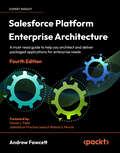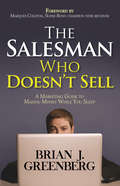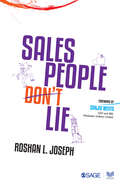- Table View
- List View
Salesforce For Dummies
by Liz Kao Jon PazGet up to lightning speed with this fully updated, bestselling guide to using Salesforce.com! Salesforce.com For Dummies, 7th Edition gives you an edge in building relationships and managing your company's sales, marketing, customer service, and support operations. You’ll learn how to maximize the new user interface to organize contacts, schedule business appointments, use forecasting tools to predict upcoming sales, make accurate projects based on past performance, and more. Written by Salesforce.com insiders with years of expertise in CRM services, this new edition covers the latest enhancements to Salesforce.com, the world's most popular customer relationship management software. You’ll find out how to determine the right configuration to suit your business needs, and how to use apps, widgets, and tools to personalize your system. Then, you’ll explore prospecting leads, managing accounts and partners, developing contacts, tracking products, calculating forecasts, and utilizing service and support. Customize the new user interface with apps, widgets, and tools Prospect leads, drive sales, and provide outstanding customer service Manage contacts, identify opportunities, and analyze your results Collaborate with colleagues using Chatter More than 150,000 companies worldwide use Salesforce.com as their CRM solution—if you’re a new or existing user looking to maximize the potential of the new UI, this book has everything you need.
Salesforce For Dummies
by Liz Kao Jon PazYour easy-to-follow guide to the world’s leading cloud-based CRM software Salesforce gives your business an edge in tracking relationships and managing sales, marketing, customer service, and support operations. Salesforce For Dummies help you take advantage of key platform functionality and focus on making the most of its many features. Learn best practices to determine the right configuration to suit your business needs, and how to use apps, build widgets, and configure features to personalize your system for your business. Explore prospecting for leads, managing accounts, maintaining contacts, tracking products, calculating forecasts, and monitoring each customer’s service and support interactions with your business. Collaborate with colleagues by sharing information across a 360-degree view of all customer interactions, enhance your online marketing, gain real-time visibility into sales, and close deals faster. Get started with configuring Salesforce and set up the apps that your business needs Discover the latest updates to Salesforce, including Flow Builder, Lightning, and Einstein Improve business performance with reporting insights, collaborative communication features, and integrated sales and marketing processes Find new ways to improve productivity and reduce administration timeSalesforce For Dummies is the fully updated, best-selling guide that helps new and existing users get up to speed with the world’s top CRM.
Salesforce Lightning Platform Enterprise Architecture: Architect and deliver packaged applications that cater to enterprise business needs, 3rd Edition
by Andrew FawcettA comprehensive guide filled with best practices and tailor-made examples - a must-read for all Lightning Platform architects! Key Features Use the Lightning Platform to build integrated, scalable, and robust apps focused on enterprise-level customer demands Use the Lightning Component framework to deliver modern and responsive user experiences targeting multiple devices through Lightning Experience and Salesforce Mobile Extend your application with access to external services and AI Book Description Salesforce Lightning provides a secure and scalable platform to build, deploy, customize, and upgrade applications. This book will take you through the architecture of building an application on the Lightning platform to help you understand its features and best practices, and ensure that your app keeps up with your customers' increasing needs as well as the innovations on the platform. This book guides you in working with the popular aPaaS offering from Salesforce, the Lightning Platform. You'll see how to build and ship enterprise-grade apps that not only leverage the platform's many productivity features, but also prepare your app to harness its extensibility and customization capabilities. You'll even get to grips with advanced application architectural design patterns such as Separation of Concerns, Unit Testing and Dependency Integration. You will learn to use Apex and JavaScript with Lightning Web Components, Platform Events, among others, with the help of a sample app illustrating patterns that will ensure your own applications endure and evolve with the platform. Finally, you will become familiar with using Salesforce DX to develop, publish, and monitor a sample app and experience standard application life cycle processes along with tools such as Jenkins to implement CI/CD. By the end of this book, you will have learned how to develop effective business apps and be ready to explore innovative ways to meet customer demands. What you will learn Create and deploy AppExchange packages and manage upgrades Understand Enterprise Application Architecture patterns Customize mobile and desktop user experience with Lightning Web Components Manage large data volumes with asynchronous processing and big data strategies Implement Source Control and Continuous Integration Add AI to your application with Einstein Use Lightning External Services to integrate external code and data with your Lightning Application Who this book is for This book is for Lightning platform developers who want to discover the true potential of the platform to develop complex scalable applications for use in enterprise businesses.
Salesforce Marketing Cloud For Dummies
by Chester Bullock Mark PollardSalesforce Marketing Cloud: Take your digital marketing on a journey! Everything seems to be moving to the cloud these days—and digital marketing is no exception! Salesforce Marketing Cloud For Dummies guides you through the use of Salesforce's exciting suite of cloud-based digital marketing solutions, which have the power to help you plan, personalize, and optimize your customers' journey. Written by a leader of the Salesforce training and development team, Salesforce Marketing Cloud users will find essential information on using the suite of tools and tips and tricks that only an insider would be able to share. With easy-to-follow instructions, this guide helps you discover how to incorporate your data sets into the tools to create models, campaigns, and customer maps that enable you to create a positive experience for your customers. As Salesforce.com's multi-channel digital marketing platform, the Salesforce Marketing Cloud focuses on helping you manage one-on-one customer journeys. Leveraging a variety of features, this suite of tools offers email marketing, mobile marketing, social media marketing, content and messaging, predictive intelligence, and more. Your ability to navigate these features and functions will determine your digital marketing campaign's success, so it's critical that you make the most of this tool! Navigate and manage the Salesforce Marketing Cloud Define and understand your customers' journeys—and how you fit into them Engage your customers across devices, ensuring consistent communication Use predictive data to optimize engagement Salesforce Marketing Cloud For Dummies helps you make the most of your investment in the digital marketing world!
Salesforce Platform App Builder Certification Guide
by Paul GoodeyThis Salesforce book is for aspiring developers who want to learn how to build apps on the Salesforce Platform or pass the Salesforce Platform App Builder certification exam. Salesforce administrators who are looking to learn Salesforce development skills to build apps will also find this book useful.
Salesforce Platform Developer I Certification Guide: Expert tips, techniques, and mock tests for the Platform Developer I (DEV501) certification exam
by Jan Vandevelde Gunther RoskamsBuild and deploy scalable applications on the Salesforce Lightning Platform using the latest features of Spring '19Key FeaturesAn end-to end-guide with practice tests to help you achieve the Salesforce Platform Developer certificationDesign data models, user interfaces, and business logic for your custom applicationsUnderstand the complete development life cycle from designing to testingBook DescriptionSalesforce Lightning Platform, used to build enterprise apps, is being increasingly adopted by admins, business analysts, consultants, architects, and especially developers. With this Salesforce certification, you'll be able to enhance your development skills and become a valuable member of your organization.This certification guide is designed to be completely aligned with the official exam study guide for the latest Salesforce Certified Platform Developer I release and includes updates from Spring '19. Starting with Salesforce fundamentals and performing data modeling and management, you’ll progress to automating logic and processes and working on user interfaces with Salesforce components. Finally, you'll learn how to work with testing frameworks, perform debugging, and deploy metadata, and get to grips with useful tips and tricks. Each chapter concludes with sample questions that are commonly found in the exam, and the book wraps up with mock tests to help you prepare for the DEV501 certification exam.By the end of the book, you’ll be ready to take the exam and earn your Salesforce Certified Platform Developer I certification.What you will learnSolve sample questions and mock tests and work with exam patternsGain an understanding of declarative Salesforce tools such as Process Builder, flows, and many moreCode in Salesforce using the Developer Console and IDEsGrasp the basics of object-oriented programmingWrite Apex classes, Visualforce pages, and Apex test classes with easy-to-follow stepsExplore the different deployment tools that you can use to push metadata to different environmentsBuild custom declarative apps and programs on Force.com platformsWho this book is forThe Salesforce Platform Developer I Certification Guide is for you if you want to learn how to develop and deploy business logic and user interfaces using the capabilities of the Lightning Platform. No prior knowledge of Apex programming is required.
Salesforce Platform Enterprise Architecture: A must-read guide to help you architect and deliver packaged applications for enterprise needs, 4th Edition
by Andrew Fawcett Daniel J. PeterDeliver impressive enterprise-grade applications using the Salesforce Platform with the help of established architectural patterns and best developer practices.Key FeaturesUse the latest capabilities of the Salesforce Platform to code robust apps and web experiences, with an extended focus on Lightning Web ComponentsBranch out to Java, Node.js, and other languages with a new chapter exploring app development capabilities using Heroku and FunctionsExtend your application with access to external services following new coverage of OpenAPI enabled API servicesBook DescriptionSalesforce makes architecting enterprise grade applications easy and secure – but you'll need guidance to leverage its full capabilities and deliver top-notch products for your customers. This fourth edition brings practical guidance to the table, taking you on a journey through building and shipping enterprise-grade apps. This guide will teach you advanced application architectural design patterns such as separation of concerns, unit testing, and dependency injection. You'll also get to grips with Apex and fflib, create scalable services with Java, Node.js, and other languages using Salesforce Functions and Heroku, and find new ways to test Lightning UIs. These key topics, alongside a new chapter on exploring asynchronous processing features, are unique to this edition. You'll also benefit from an extensive case study based on how the Salesforce Platform delivers solutions. By the end of this Salesforce book, whether you are looking to publish the next amazing application on AppExchange or build packaged applications for your organization, you will be prepared with the latest innovations on the platform.What you will learnCreate and deploy packaged apps for your own business or for AppExchangeUnderstand Enterprise Application Architecture patternsCustomize the mobile and desktop user experience with Lightning Web ComponentsManage large data volumes with asynchronous processing and big data strategiesLearn how to go beyond the Apex language, and utilize Java and Node.js to scale your skills and code with Heroku and Salesforce FunctionsTest and optimize Salesforce Lightning UIsUse Connected Apps, External Services, and Objects along with AWS integration tools to access off platform code and data with your applicationWho this book is forIf you are a Salesforce developer who wants to unlock the true potential of the Salesforce platform and deliver complex, scalable applications within your company or for use in large enterprises you target through AppExchange, then you have come to the right place. You will need a solid foundation of Salesforce development to dive into this book – it is here to elevate your skills, not teach you the basics.
Salesforce Service Cloud For Dummies
by T. J. Kelley Jon PazLearn how to provide top-grade customer service anywhere, anytime with Salesforce Service Cloud Salesforce Service Cloud empowers your service organization to interact with customers through any channel and provide an individualized experience that will be worth sharing--for your customers and for your company. Salesforce Service Cloud For Dummies is one the first books to focus specifically on Salesforce Service Cloud software. With it, you'll discover how to set up a sophisticated support center for your business in a matter of a few hours. Whether you're a service executive, manager, support agent, or system administrator, you will discover how to maximize usage of Service Cloud through best practices and step-by-step guidelines. This book will help your customer service departments gain a holistic view of the customers they serve, and provide your customers with meaningful, efficient interactions. Examines how to enable your agents to provide efficient service Discusses how to interact with customers through any channel Offers insights on improving internal communication and collaboration Shows how to resolve customer's questions in a timely manner Take advantage of this opportunity to be heard above your competition with the help of Salesforce Service Cloud For Dummies.
The Salesman Who Doesn't Sell: A Marketing Guide for Making Money While You Sleep
by Brian J. GreenbergThe internet provides a remarkable platform for large and small businesses alike, and learning how to take advantage of this incredible tool can mean more publicity, more customers, and more sales—all with less work for entrepreneurs. A successful SEO marketing professional with decades of experience developing passive-income businesses online, Brian Greenberg—the salesman who doesn’t sell—shares his unique, time-honed strategies to drastically increase sales without putting in overtime hours. This book is an indispensable resource for any professional looking to increase business, from doctors to restaurant owners to e-commerce entrepreneurs.
The Salesman's Little Blue Book of Daily Inspiration
by Christopher CunninghamMotivation, Christian spiritual inspiration and daily devotions for those working in sales careers—the perfect gift for the salesperson in your life.Where does a sales person turn when the sales order doesn’t come through; when the special event doesn’t go as planned; when the forecast was too high; when the customer says “no”? In a competitive and stress-filled work environment, sales professionals are looking for a shot of encouragement and inspiration. The author invites readers on a 21-day journey to discover a better way to sell, and indeed, a better way to live. It’s a process that pushes as well as encourages, but ultimately helps sales professionals find balance in a job that can sometimes create turbulence. His goal is for readers to find an inner peace and be blessed with all the gifts God has planned for them—and through this peace, find a better way to sell and live. The book concludes with specific scriptural insights and promises on 21 challenges salesmen face—from temptation, to product problems, to a difficult customer relationship.
SaleSoft, Inc. (A)
by Das NarayandasSaleSoft, a start-up firm, markets Comprehensive Sales Automation Solutions (CSAS) that automate a firm's sales, marketing, and service functions. Even though the product has received very favorable responses from prospects, product complexity and a long buying cycle have made it difficult for the firm to convert interest into sales orders. SaleSoft now has an opportunity to sell a part of the total CSAS solution as a stand-alone product. This "Trojan Horse" (TH) product offers an easy way for the firm to enter new customer accounts, gain quick sales, and generate much needed revenues. However, it could potentially distract the firm from its primary objective and cannibalize CSAS sales. SaleSoft needs to decide whether to continue selling CSAS or launch TH. And, the firm needs to develop a detailed marketing strategy to implement this decision.
Salespeople Don’t Lie
by Roshan Louis JosephSales malpractice accounts for huge losses in businesses worldwide. The way to bring attention to this malaise is to ensure that salespeople worldwide understand the damage this malpractice causes. This book is a mission to spread the word on how sales can be a profession that does good for customers and adds value to their lives. A salesperson can be someone who does good for the society and to every individual who needs help in making the right decision about a product they wish to purchase. One of the basic tenets of a sales team that meets customers face-to-face is that sales grow as the relationship grows between the customer and the salesperson. Trust is the principal ingredient that keeps relationships going. When a salesperson lies, it is an assault on the very core of the relationship. Truth and transparency while hard to choose, is less painful in the long run. The book advocates using a professional sales system that facilitates sales successes in an easy and legitimate way. A robust sales system not only helps in achieving sales targets but has an overall impact on the motivation of the sales team, thereby curtailing attrition. When you don’t fear sales, you never have to lie.
Sally Jameson: Valuing Stock Options in a Compensation Package (Abridged)
by Peter TufanoDetails a thinly disguised situation facing a recent Harvard MBA graduate who was forced by a prospective employer to place a dollar value on a grant of stock options. There are two objectives: 1) Serves as an introduction to option valuation, in which students have an opportunity to use market data to value an option in a realistic setting. 2) The setting permits a broader discussion of the wisdom of option-based incentive plans and the popular misconceptions of the value of option grants based on a widespread misunderstanding of how options work and how they are valued.
Sally Jameson: Valuing Stock Options in a Compensation Package
by Peter Tufano Michael LewittesDetails a thinly disguised situation faced by a recent Harvard MBA graduate who was forced by a prospective employer to place a dollar value on a grant of stock options. There are two objectives: 1) Serves as an introduction to option valuation, in which students have an opportunity to use market data to value an option in a realistic setting. 2) The setting permits a broader discussion of the wisdom of option-based incentive plans and the popular misconceptions of the value of option grants based on a widespread misunderstanding of how options work and how they are valued.
The Salmon Capital of Michigan: The Rise and Fall of a Great Lakes Fishery (Great Lakes Books Series)
by Carson PrichardWeaving together the stories and voices of residents, anglers, community leaders, and environmental workers and researchers, this ethnographic account details the lives and livelihoods impacted by a once-unrivaled Michigan salmon fishery. From the introduction of Chinook salmon to the Great Lakes in the late 1960s, a thriving recreational fishery industry arose in Northern Michigan, attracting thousands of anglers to small towns like Rogers City each week at its peak. By the early 2000s, a crisis loomed beneath the surface of Lake Huron as the population of a prey fish species called alewife unexpectedly collapsed, depleting the salmon’s main source of food. By 2007, the salmon population had collapsed too, leaving local fisheries and their respective communities lacking a key commodity and a bid on fishery tourism. Author, angler, and ecologist Carson Prichard artfully incorporates fisheries science and local news media into an oral history that is entertaining, rich, and genuine. Complementing an ecological understanding of events, this narrative details the significance of the fishery and its loss as experienced by the townspeople whose lives it touched.
Salmon Wars: The Dark Underbelly of Our Favorite Fish
by Catherine Collins Douglas FrantzA Pulitzer Prize-winning correspondent and a former private investigator dive deep into the murky waters of the international salmon farming industry, exposing the unappetizing truth about a fish that is not as good for you as you have been told.A decade ago, farmed Atlantic salmon replaced tuna as the most popular fish on North America’s dinner tables. We are told salmon is healthy and environmentally friendly. The reality is disturbingly different.In Salmon Wars, investigative journalists Douglas Frantz and Catherine Collins bring readers to massive ocean feedlots where millions of salmon are crammed into parasite-plagued cages and fed a chemical-laced diet. The authors reveal the conditions inside hatcheries, where young salmon are treated like garbage, and at the farms that threaten our fragile coasts. They draw colorful portraits of characters, such as the big salmon farmer who poisoned his own backyard, the fly-fishing activist who risked everything to ban salmon farms in Puget Sound, and the American researcher driven out of Norway for raising the alarm about dangerous contaminants in the fish. Frantz and Collins document how the industrialization of Atlantic salmon threatens this keystone species, endangers our health and environment, and lines the pockets of our generation's version of Big Tobacco. And they show how it doesn't need to be this way.Just as Eric Schlosser’s Fast Food Nation forced a reckoning with the Big Mac, the vivid stories, scientific research, and high-stakes finance at the heart of Salmon Wars will inspire readers to make choices that protect our health and our planet.
Salomon and the Treasury Securities Auction
by Patrick Moreton Dwight B. CraneSet in June 1991, two months prior to Salomon Brothers' announcement that the firm had violated the Treasury Department's rules governing the auctions of new Treasury securities. Salomon Vice Chairman John Meriwether must decide how to address problems that continue to appear in the management of the firm's government bond trading activities. In April 1991, one of his managers admitted that he had submitted an illegal auction bid in February 1991. Now, one month later, there is mounting speculation in the press that Salomon tried to corner the market for May 2-year notes. Structured to allow students to analyze the ethical, legal and managerial dimensions of John Meriwether's situation. Background information about the history of Salomon Brothers and the investment banking industry, the markets for government securities, and the regulation of securities dealers and brokers is interwoven with Meriwether's story. Accessible to individuals with and without experience in investment banking.
Salomon Brothers (A)
by Lynn Sharp PaineDescribes Salomon Brothers' recovery from the August 1991 Treasury auction scandal. Details the impact of the firm's disclosure of bidding improprieties and describes how the new management team, led by Warren Buffett and Deryck Maughan, guided the company through the ensuing crisis. The impact of the crisis is followed through the end of 1992. A rewritten version of an earlier case.
Salomon Brothers (B)
by Lynn Sharp PaineSupplements the (A) case. A rewritten version of an earlier case.
Salon Fundamentals Cosmetology, Resource for Your Cosmetology Career Exam Prep, 2nd Edition
by Pivot Point International StaffA Resource for preparation of Cosmetology Career Exam and Cosmetology Licensure Exam.
Salsa, Soul, and Spirit: Leadership for a Multicultural Age
by Juana BordasConsultant Bordas describes a multicultural model of leadership that incorporates traditional Latino, African American, and American Indian concepts and practices. She describes eight core leadership principles that are common to all three cultures. These include (for example) generosity, community conferred leadership, and universal kinship. The material is based in part on interviews conducted with such visionary leaders as Ada Deer (first woman to head the U.S. Bureau of Indian Affairs) and Raul Yzaguirre (founder of the Hispanic Association for Corporate Responsibility). Bordas is President of Mestiza Leadership International. Annotation ©2007 Book News, Inc., Portland, OR (booknews.com)
Salsa, Soul, and Spirit: Leadership for a Multicultural Age
by Juana BordasIdentifies nine core leadership principles common to Latino, African American, and American Indian cultures Incorporates these principles into a multicultural leadership model that is uniquely suited to our changing demographics Combines personal reflections, interviews with community leaders, historical background, and contemporary case examples One of America's historic strengths has been our ability to incorporate aspects from many different cultures to create a stronger whole. Our music, literature, language, architecture, food, fashion, and more have all benefitted. But leadership approaches have remained distressingly Eurocentric. Juana Bordas set out to change this in the first edition of this influential book. She showed that incorporating Latino, African American, and American Indian approaches to leadership into the mainstream can strengthen leadership practices and better inspire today's ethnically rich workforce. This message has only become more urgent. The 2010 census revealed that in four decades minorities will constitute over 50 percent of the population--and in one decade a majority of Americans under age eighteen will be nonwhite. More than ever we need a leadership model that resonates with our country's growing diversity. Bordas incorporates this latest census data into this second edition, which now identifies nine--rather than the previous edition's eight--core leadership principles common to all three cultures. The new principle deals with intergenerational leadership, of vital importance now that many organizations will have four generations working side by side. Using a lively blend of personal reflections, interviews with leaders from each community, historical background, and insightful analysis, Bordas illustrates the creative ways these principles have been put into practice in communities of color. The multicultural leadership model developed in this book offers a more flexible and inclusive way to lead and a new vision of the role of the leader in organizations and in our increasingly multicultural world. "Study the nine beautifully illustrated and resourced principles in this book and you'll find that they are both universal and timeless. Only by honoring and celebrating diversity can we synergistically produce unity, including peace and prosperity for all." --Stephen R. Covey, author of The 7 Habits of Highly Effective People
Salt Harbor: Confidential Information for Easterly
by Michael A. WheelerTwo-party negotiation involving a bed and breakfast and an incoming coffee chain.
Salt Harbor: Confidential Information for Brims
by Michael A. WheelerTwo-party negotiation involving a bed and breakfast and an incoming coffee chain.
Salt Harbor: Confidential Information for Brims
by Michael A. WheelerTwo-party negotiation involving a bed and breakfast and an incoming coffee chain.















